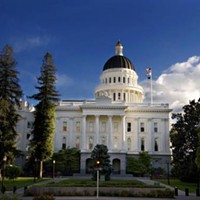[
{
"name": "Top Stories Video Pair",
"insertPoint": "7",
"component": "17087298",
"parentWrapperClass": "fdn-ads-inline-content-block",
"requiredCountToDisplay": "1"
}
]
We pay taxes and local fees for water, sewage, garbage and protection, for essential services and infrastructure — an expected, rational cost for the common good. But there is one area of overlooked expense, one fraught with irrationality and inequity; namely, the literally millions of our local dollars going to buy health plans, including some high-level "Cadillac" policies for employees of our various civic institutions, city councils and service districts.
Employees who enjoy these plans benefit from employer-subsidized low premiums and a golden medical safety net. Either they are not aware, or choose to ignore, the less visible costs they and all of us pay in addition to premiums to fill a growing deficit. The burgeoning medical need of some 12 million uninsured and underinsured has to be factored into our personal costs, which burden the economic well-being of our state. At the other end of the spectrum, all Californians are also paying for high-priced, lifetime healthcare plans for our lawmakers, both state and federal. We in the middle are left to scramble for our own health security. We don't have to continue to do this.
Healthcare costs in California, according to Assemblyman Jim Wood's recent Select Committee report on healthcare, are now at a whopping $400 billion a year and expected to reach half a trillion dollars in a decade under our current system. All civic and business institutions, not to mention families and individuals, stagger under the burden of escalating medical and insurance costs. Our own North Coast Co-op, for example, reports a devastating $1 million-plus healthcare price tag this fiscal year, the McKinleyville Community Services District's health insurance costs are more than $700,000 and even little Willow Creek struggles with a more than $90,000 annual insurance cost, to mention a few. Most of these institutions are eager to do something about it.
Today, the main access to health security is offered through private, for-profit insurance companies. But when it comes to public service groups that serve the common good and whose mission statements promise "fiscal responsibility" to constituents, buying into such corporate profiteering defeats that promise. Surely our leaders would like to do better, if they could find a way to use that money to improve our service instead of servicing insurance company coffers.
There is a way. The Healthy California Act, Senate Bill 562, proposes to change the way Californians pay for their healthcare services. A single-payer system would obviate the need for multiple payers (namely, insurance companies) who waste some 30 to 50 percent of our healthcare dollars on administrative and advertising costs, duplicative and opaque paperwork, obscene CEO salaries and bonuses, and huge profits to delight their stockholders, according to a University of Massachusetts report. (Aetna CEO Mark Bertolini's salary in 2017 hit $160,000 per day and last year that company took in more than $2.2 billion, according to SEC filings.) Not to mention the lawyers and policy wonks hired to deny and restrict payments. Your healthcare is the last of their concerns.
Instead, under S.B. 562, healthcare providers would be paid from a state-monitored, publicly transparent, nonprofit trust fund absorbing all state and federal healthcare monies that now serve our system. That single fund would be dedicated to paying all medical and hospital bills (federal waivers needed for this are currently mandated by the Affordable Care Act, as specifically indicated by Assemblyman Wood's Select Committee on Healthcare, even as Wood, himself, denies their accessibility). Cutting out the middlemen who collect profits and charge us to pay our bills would save the state some $37 billion, reducing the cost of universal care to $331 billion. California already collects $225 billion from federal and state subsidies that would be transferred to the single-payer, nonprofit trust fund from which all medical bills would be paid. The additional approximately $106 billion could be garnered through small increments of payroll and sales taxes (for details, Google, "SB 562 Pollin report").
Immediate protest can be heard loud and clear: "But we don't want any more taxes!" To that, please consider: What if you never had to pay another medical bill, healthcare insurance premium, co-pay, deductible, out-of-pocket or out-of-network fee? And you could go for any treatment by any doctor, clinic or hospital, regardless of employment or lack thereof, age, gender, marital status or pre-existing conditions? Surely that's worth a few-cents-on-the-dollar sales tax.
Unfortunately, S.B. 562 now languishes in the Assembly Rules Committee, unilaterally sequestered by Speaker Anthony Rendon. Our own assemblyman, Jim Wood, abides that imprisonment. He claims to support the concept of universal healthcare coverage, but "just not by this bill." Why? There is the niggling question of the more than $500,000 in campaign donations Wood has received from the healthcare industry, according to the National Institute of Money in Politics, donations he insists have no effect on his politics. Revealingly, however, he does want corporate insurers to play a role in his idea of universal coverage, a death-knell to the single-payer concept. Until we get money out of politics, the taint of cash poisons every word from a politician's mouth, all claims to the contrary notwithstanding.
A coalition of single-payer supporters is being created on the North Coast, represented by civic institutions that speak for all of us to show our legislators that we are united in a desire for single-payer healthcare. The city councils of Trinidad, Arcata, Eureka and Blue Lake as well as the community services districts of Manila, Willow Creek and Redway all suffer the crippling cost of healthcare premiums. They understand the financial relief they would enjoy by jettisoning this insurance burden. Accordingly, they have all signed a formal resolution to support movement of S.B. 562 into law.
There are, however, some arenas that have so far been ambivalent about entertaining real debate on this issue; specifically, the Fortuna and Ferndale city councils, the McKinleyville Community Services District and our own Humboldt County Board of Supervisors. (Witness the BOS discussion here: https://youtu.be/8qesUqbcYPQ). Certainly these community leaders have immediate pressures and issues to wrestle. How much more easily might they contend with those issues given the added financial flexibility and freedom of being relieved of health insurance costs?
Yes, people are afraid of change, but moving to a single-payer system is not reinventing the wheel. We have the instructive example of nearly every other industrialized democracy around the world that enjoys some form of single-payer healthcare. No one from another country has ever expressed the desire to trade for our non-system, as they spend half what we do on healthcare yet have better health outcomes. No one in these countries goes broke or homeless or dies from lack of medical care. California is the fifth largest economy in the world. To suggest we "can't afford" healthcare strains credibility. The reality is, we can't afford not to.
In the 1960s, the doctors of Saskatchewan screamed bloody murder at the idea of such a healthcare revolution. They even went on strike. As of today, they have been enjoying their single-payer system for almost 50 years. The latest from Canada was an article about how doctors in Toronto were offered a hefty pay raise: they refused, saying, "We already make plenty of money, please use the funds to improve the details of our public system" (BBC News, March 8, Why Quebec Doctors Have Rejected a Pay Raise).
So the real crisis before us is public understanding. The powers that be need to hear that we do understand what's at stake and we want them to do something about it. We don't have money for big political contributions but we do have our voices. That's where you come in. Every citizen of this district who cares about how their taxes and service fees are spent and envisions an equitable, universal, nonprofit solution to our current healthcare crisis should invite Fortuna, Ferndale, McKinleyville and the board of supervisors to free themselves from the chains of corporate health insurance by joining the 70 percent of Californians who want a single-payer system.
Please contact and encourage the following groups to learn about, discuss and vote to move S.B. 562 forward in the Assembly:
Ferndale City Council, (707) 786-4224 or [email protected]
Fortuna City Council, (707) 725-1409
McKinleyville CSD, (707) 839-3251 or [email protected]
Humboldt County Board of Supervisors, (707) 476-2396
Assemblyman Jim Wood, (707) 445-7014, (916) 319-2002 or email him directly from his website
Even better, go to their regular meetings where you will be allowed a three-minute public comment and a chance to stand up for the best county and state we can be. With your help, it can be done.
Patty Harvey lives in Willow Creek, is a retired teacher and current director of Health Care for All-Humboldt. She has been a Humboldt County resident off and on for more than five decades.
Have something you want to get off your chest? Think you can help guide and inform public discourse? Then the North Coast Journal wants to hear from you. Contact us at [email protected] to pitch your column ideas.
Speaking of...
more from the author
-
California Says No to Privatizing Medicare
- Sep 21, 2023
- More »
Latest in Views
Readers also liked…
-
Hope
- Sep 7, 2023
-
California Says No to Privatizing Medicare
- Sep 21, 2023


































